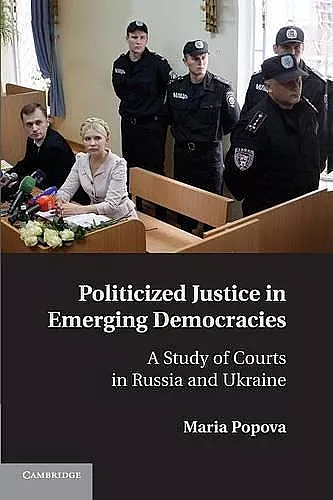Politicized Justice in Emerging Democracies
A Study of Courts in Russia and Ukraine
Format:Paperback
Publisher:Cambridge University Press
Published:6th Mar '14
Currently unavailable, and unfortunately no date known when it will be back
This paperback is available in another edition too:
- Hardback£100.00(9781107014893)

This book proposes a strategic pressure theory that argues that in emerging democracies, political competition eggs on rather than restrains power-hungry politicians.
Why are independent courts rarely found in emerging democracies? This book moves beyond familiar obstacles, such as an inhospitable legal legacy and formal institutions that expose judges to political pressure. It proposes a strategic pressure theory, which claims that in emerging democracies, political competition eggs on rather than restrains power-hungry politicians. Incumbents who are losing their grip on power try to use the courts to hang on, which leads to the politicization of justice. The analysis uses four original datasets, containing 1,000 decisions by Russian and Ukrainian lower courts from 1998 to 2004. The main finding is that justice is politicized in both countries, but in the more competitive regime (Ukraine) incumbents leaned more forcefully on the courts and obtained more favorable rulings.
'… Politicized Justice in Emerging Democracies is an interesting and noteworthy contribution to the literature on courts in post-Soviet Russia and Ukraine. It demonstrates a masterful combination of various research methods, a coherent and convincing narrative and the courage to study a highly politicised and understudied topic.' Yuliya Zabyelina, Europe-Asia Studies
'… Popova achieves much with her clear writing and sharp analysis: her original theory builds upon work of other scholars and is borne out by her detailed study, which challenges the prevailing conception of the relationship between political competition and judicial independence. It also confirms a gap - or more aptly, a chasm - between de jure and de facto judicial independence in these post-Soviet states.' The Cambridge Law Journal
'For comparative judicial scholars, especially those who have had a longstanding focus on the performance of civil rights and liberties in the democratizing world - and more specifically the post-Soviet realm - this is an indispensable book. It challenges readers to think hard about the socio-political context in which institutional reform takes place, warning us against placing too much hope on the ability of the law as a tool to hold political authorities accountable without taking into consideration the limits imposed by the specific reality in which they operate. More importantly, Popova's book makes a significant contribution to the study of judicial independence in comparative perspective. Its clear theoretical framework, meticulous analysis of both qualitative and quantitative data, and thorough discussion of both formal institutions and informal political dynamics, make it mandatory reading in graduate syllabi in the field …' Raul A. Sanchez Urribarri, Global Law Books (www.globallawbooks.org/home.asp)
- Winner of American Association for Ukrainian Studies Book Prize 2012–2013
ISBN: 9781107694033
Dimensions: 229mm x 152mm x 11mm
Weight: 290g
210 pages